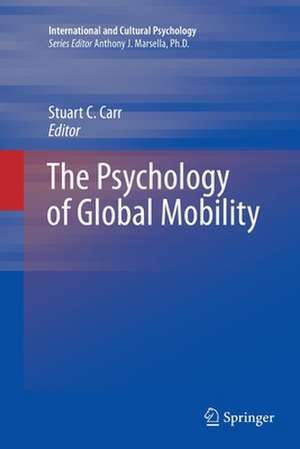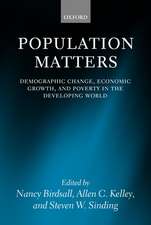The Psychology of Global Mobility: International and Cultural Psychology
Editat de Stuart C. Carren Limba Engleză Paperback – 5 sep 2012
The book details the historical, methodological, and theoretical trajectory of human mobility (Context), followed by sections on pre-departure incentives and predispositions (Motivation), influences on acculturation, health and community fit (Adjustment), and changes in career capital, overcoming bias, and diaspora networks (Performance).
| Toate formatele și edițiile | Preț | Express |
|---|---|---|
| Paperback (1) | 892.74 lei 6-8 săpt. | |
| Springer – 5 sep 2012 | 892.74 lei 6-8 săpt. | |
| Hardback (1) | 1225.62 lei 6-8 săpt. | |
| Springer – 28 iul 2010 | 1225.62 lei 6-8 săpt. |
Din seria International and Cultural Psychology
- 18%
 Preț: 1117.03 lei
Preț: 1117.03 lei - 17%
 Preț: 490.68 lei
Preț: 490.68 lei - 15%
 Preț: 587.02 lei
Preț: 587.02 lei - 15%
 Preț: 647.40 lei
Preț: 647.40 lei - 5%
 Preț: 718.10 lei
Preț: 718.10 lei - 24%
 Preț: 797.39 lei
Preț: 797.39 lei - 20%
 Preț: 564.52 lei
Preț: 564.52 lei - 18%
 Preț: 1693.62 lei
Preț: 1693.62 lei - 18%
 Preț: 1010.48 lei
Preț: 1010.48 lei - 18%
 Preț: 784.13 lei
Preț: 784.13 lei - 18%
 Preț: 780.52 lei
Preț: 780.52 lei - 18%
 Preț: 946.24 lei
Preț: 946.24 lei - 15%
 Preț: 641.85 lei
Preț: 641.85 lei - 18%
 Preț: 952.57 lei
Preț: 952.57 lei - 5%
 Preț: 1031.68 lei
Preț: 1031.68 lei - 15%
 Preț: 637.13 lei
Preț: 637.13 lei - 5%
 Preț: 708.78 lei
Preț: 708.78 lei - 15%
 Preț: 476.75 lei
Preț: 476.75 lei - 18%
 Preț: 1120.18 lei
Preț: 1120.18 lei - 15%
 Preț: 638.76 lei
Preț: 638.76 lei - 20%
 Preț: 556.10 lei
Preț: 556.10 lei - 15%
 Preț: 700.10 lei
Preț: 700.10 lei - 15%
 Preț: 697.94 lei
Preț: 697.94 lei - 5%
 Preț: 1095.90 lei
Preț: 1095.90 lei - 18%
 Preț: 999.94 lei
Preț: 999.94 lei - 24%
 Preț: 842.28 lei
Preț: 842.28 lei - 15%
 Preț: 646.62 lei
Preț: 646.62 lei - 18%
 Preț: 947.95 lei
Preț: 947.95 lei - 5%
 Preț: 1098.27 lei
Preț: 1098.27 lei - 20%
 Preț: 552.45 lei
Preț: 552.45 lei - 15%
 Preț: 649.54 lei
Preț: 649.54 lei - 18%
 Preț: 785.55 lei
Preț: 785.55 lei - 18%
 Preț: 947.67 lei
Preț: 947.67 lei - 18%
 Preț: 947.98 lei
Preț: 947.98 lei - 18%
 Preț: 952.26 lei
Preț: 952.26 lei
Preț: 892.74 lei
Preț vechi: 1088.70 lei
-18% Nou
Puncte Express: 1339
Preț estimativ în valută:
170.88€ • 185.68$ • 143.63£
170.88€ • 185.68$ • 143.63£
Carte tipărită la comandă
Livrare economică 21 aprilie-05 mai
Preluare comenzi: 021 569.72.76
Specificații
ISBN-13: 9781461426264
ISBN-10: 146142626X
Pagini: 352
Ilustrații: X, 342 p.
Dimensiuni: 155 x 235 x 18 mm
Greutate: 0.49 kg
Ediția:2010
Editura: Springer
Colecția Springer
Seria International and Cultural Psychology
Locul publicării:New York, NY, United States
ISBN-10: 146142626X
Pagini: 352
Ilustrații: X, 342 p.
Dimensiuni: 155 x 235 x 18 mm
Greutate: 0.49 kg
Ediția:2010
Editura: Springer
Colecția Springer
Seria International and Cultural Psychology
Locul publicării:New York, NY, United States
Public țintă
ResearchCuprins
Introduction: The Psychology of Global Mobility.- Introduction: The Psychology of Global Mobility.- Context.- Human Mobility in a Global Era.- Mixed-Methods Approaches to Contextually Grounded Research in Settings of Armed Conflict and Natural Disaster.- Ethical Psychological Practice with Geographically Mobile Individuals and Groups.- Motives.- Mobility and Personality.- Identity and Global Mobility.- Global Mobility, Local Economy: It’s Work Psychology, Stupid!.- The Psychology of Enforced Mobility.- Adjustment.- Global Mobility and Cross-Cultural Training.- Mobility and Acculturation.- Mobility and Inclusion.- New Settlement and Wellbeing in Oppressive Contexts: A Liberation Psychology Approach.- Performance.- Mobility and Careers.- Global Mobility and Bias in the Workplace.- Technology, Mobility, and Poverty Reduction.
Recenzii
From the reviews:
“The Psychology of Global Mobility, was to assemble an international, multidisciplinary group of experts who could begin to quantify the psychological burden involved in human mobility, examine its benefits and disadvantages from the perspective of the person and the country, and provide an understanding of the drive for and result of global mobility. … Appropriate for both an academic and a practitioner audience … I would recommend as a text for a comprehensive discussion of geographic and virtual mobility for psychologists sociologists … .” (Judy E. Hall, PsycCRITIQUES, Vol. 55 (32), December, 2010)
“The Psychology of Global Mobility, was to assemble an international, multidisciplinary group of experts who could begin to quantify the psychological burden involved in human mobility, examine its benefits and disadvantages from the perspective of the person and the country, and provide an understanding of the drive for and result of global mobility. … Appropriate for both an academic and a practitioner audience … I would recommend as a text for a comprehensive discussion of geographic and virtual mobility for psychologists sociologists … .” (Judy E. Hall, PsycCRITIQUES, Vol. 55 (32), December, 2010)
Textul de pe ultima copertă
The history of human beings is the history of global mobility, as evinced by the long journeys taken by our prehistoric ancestors. And more people are currently on the move than ever before: over 200 million worldwide, a larger population than most of the world’s countries. The Psychology of Global Mobility explores the human dimensions behind the statistics—not only the stories of new immigrants and war refugees, but also business travelers, tourists, and students—for a distinctive guide to this ongoing evolution.This groundbreaking volume marks the coalescence of a newly-integrated field. It covers historical context (particularly the drastic changes of the past century); motives and behaviors associated with mobility; acculturation and other forms of adjustment; and social, political, and career capital gained by new settlers. A global long-view connects mobility to concepts of international health and human development, recognizing that both local and global knowledge are necessary for relevant, culturally-attuned practice and policy, the book:• Explains benefits as well as disadvantages of mobility.• Discusses the concept of the “mobile personality” and its real-world implications.• Describes multiple levels of methodological and ethical issues in research and practice.• Analyzes the effects of global mobility on local economies, including controversial “brain drain”/“brain gain” phenomena.• Considers the impact of information technology on physical mobility.• Provides a systems perspective on inclusion and well-being.• Offers detailed examples of interdisciplinary practice and service.The Psychology of Global Mobility is an essential text for cross-cultural psychologists, sociologists, policymakers, practitioners and researchers studying mobility, migration, and human development.
Caracteristici
Includes chapters which connect studies of mobility and motivation with development studies and international health Incorporates a global approach to the issue of mobility, taking into account various examples of mobility worldwide Offers a synthesis that is both multi-disciplinary and inter-disciplinary Includes supplementary material: sn.pub/extras













